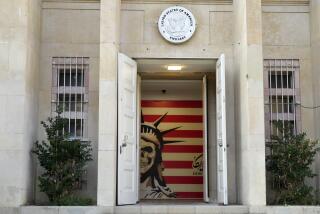Iranian Ayatollah Urges Holy War Against U.S. Buildup
- Share via
NICOSIA, Cyprus — The Ayatollah Ali Khamenei, Iran’s spiritual leader, declared Wednesday that opposition to the American military presence in the Persian Gulf region is a Muslim “holy war,” and he labeled U.S. policy “greedy, bullying and shameless.”
Any Muslim killed in the struggle against U.S. forces will be a martyr, Tehran Radio quoted Khamenei as saying.
The surprisingly harsh indictment of the U.S. military buildup topped mounting Iranian concern over the deployment of Western warships in the gulf in response to the Iraqi invasion of Kuwait on Aug. 2.
Iraqi President Saddam Hussein has called for a holy war, or jihad, against the American troops defending Saudi Arabia. The sheik of Mecca has in turn demanded a jihad against Iraq. Khamenei’s remarks, as monitored by the British Broadcasting Corp., appeared likely to increase the tension.
However, there was no indication from the reported remarks that Khamenei, successor to Iran’s late revolutionary leader, the Ayatollah Ruhollah Khomeini, was calling for Iran’s armed forces to join the conflict.
“Anyone who fights America’s aggression, its greediness and its plans to encroach on the Persian Gulf region has engaged in jihad in the cause of Allah,” the religious leader said, “and anyone who is killed on that path is a martyr.” Martyrdom has special meaning to Muslims, a promise of direct ascent to heaven.
To the Western world, Muslim martyrdom in the Middle East raises the specter of suicide attacks, and Khamenei played directly to those fears, saying:
“It’s surprising how the Americans don’t take lessons. They saw how vulnerable their presence can be. Have they forgotten how a bunch of pious Muslim youth--just that--swept them away and evicted them from Lebanon?”
He referred to the 1983 suicide truck-bombing of a U.S. Marine barracks at Beirut airport that killed 241 American servicemen. If Khamenei’s remarks were more than hyperbole--and to anti-American Muslim listeners they could be--he has introduced a dangerous element into the bristling confrontation over the Iraqi invasion of Kuwait. Tehran Radio did not identify Khamenei’s audience.
Since their deployment, American and other Western forces have taken precautions against possible commando strikes. The majority, on board about 50 warships in the region or in the deserts of Saudi Arabia, would prove difficult targets, but military personnel on leave or American civilians could prove vulnerable in gulf cities.
No other Iranian leader has taken such a bellicose line in the conflict. The ayatollah often speaks with a moderate voice, particularly on economic issues, but has made heated remarks against Western influence in the past.
Tehran has attempted to walk a policy tightrope between its antipathy to foreign forces in the area, particularly American, and its opposition to the invasion of Kuwait by a longtime enemy, Iraq. Iraqi-occupied Kuwait presents a major strategic threat to Iran.
Hussein’s promise of peace with Iran was backed up last weekend by Iraqi Foreign Minister Tarik Aziz, who was in Tehran as the first top official from Baghdad to go to Iran since Iran’s 1979 Islamic revolution. Aziz offered to normalize relations between the two oil-producing gulf powers that fought a brutal war from 1980 to 1988.
In consultations with Iranian President Hashemi Rafsanjani, the Iraqi reportedly raised the prospect of food shipments through Iran in defiance of U.N. sanctions.
More to Read
Sign up for Essential California
The most important California stories and recommendations in your inbox every morning.
You may occasionally receive promotional content from the Los Angeles Times.













